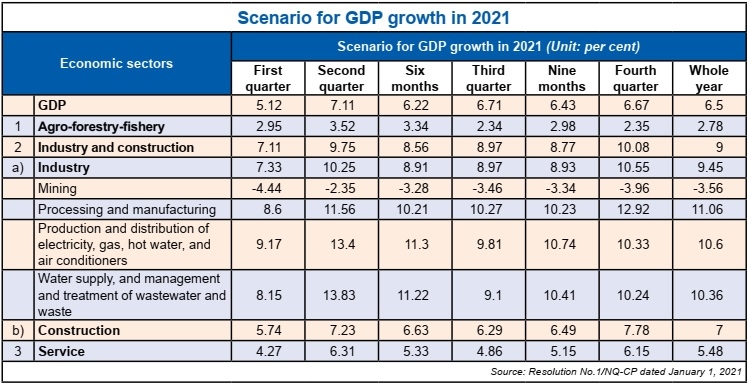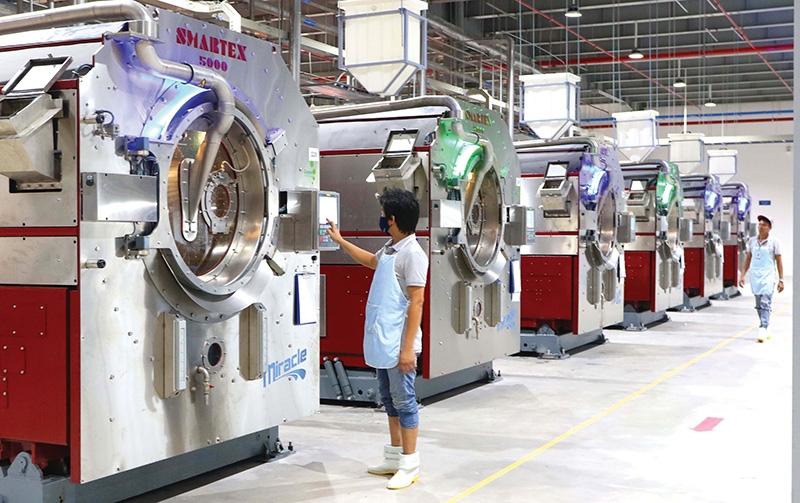with a new target for growth and wider solutions to improve national competiveness and create new space for enterprises to flourish.
The government has enacted on the first day of the new year resolutions with answers to ensure economic growth and spur on development of enterprises.
However, solutions for this year may be a bit different. Inspired by comprehensive economic attainments in 2020 in defiance of the COVID-19 pandemic, the government is looking to a brighter outlook for 2021, with more specific goals to be set (see boxes).
On January 1, Prime Minister Nguyen Xuan Phuc signed and enacted Resolution No.01/NQ-CP on key tasks for implementation of the socioeconomic development plan and state budget estimates for 2021, and Resolution No.02/ND-CP on continuing implementation of measures to improve the domestic business climate and enhance national competitiveness in 2021.
Under Resolution 01, so as to realise the socioeconomic development plan for 2021-2025, the government has identified “solidarity, discipline, innovation, and aspiration for development” as guidelines for action this year.
The government defined 11 key missions and measures, including effective implementation of tasks to serve the organisation of the Party Congress, election of deputies to the National Assembly (NA) and all-level people’s councils, and preparation, issuance, and implementation of action programmes to carry out the resolutions. The government will also continue implementation of tasks in a flexible and effective manner – to simultaneously fight the pandemic and boost economic growth; while completing institutions for the socialist-oriented market economy, thus facilitating economic recovery and development based on stabilising the macro-economy and curbing inflation rate, as well as improving the economy’s resilience.
Meanwhile, under Resolution 02, the government requested ministries, municipal and provincial people’s committees, and other governmental agencies to comprehensively and effectively enforce main tasks and solutions to enhance Vietnam’s business environment and national competitiveness in 2021.
The government ordered priority be given to improving a number of indexes and indicators regarding construction permit issuance, asset registration, settlement of contract disputes, bankruptcy of enterprises, land administrative management quality, application of information technology, quality of vocational training, students’ skills, patent granting, fighting against corruption, online transactions, job opportunities in knowledge-intensive sectors, and a sustainable ecosystem.
Both resolutions 01 and 02 aim to reach the ultimate goals of securing an economic growth rate of at least 6.5 per cent for 2021, with improvements in national economic competitiveness, and in the local investment and business climate.
The resolutions demonstrate the government’s unceasing efforts to drive the economy forward, though last November the NA seemed to take great caution when it set the economic growth target at about 6 per cent only.
Each percentage of growth can create 300,000 direct jobs and many other hundreds of thousands of indirect jobs, according to experts.
 |
Great expectations
Having operated in Vietnam for 25 years, US-backed Cargill welcomes the fresh resolutions, which it believes will help foreign firms like itself to lessen difficulties they have been facing for years.
“For example, the continuation of building advanced and integrated transport infrastructure will not only greatly improve the Vietnamese economy but will attract further investment from US companies especially in the food and agricultural sector,” explained a Cargill representative.
“Further alignment of policies with international standards, expansion of tax investment schemes, and improvements to legal business framework, regulations, and policies will go a long way in making Vietnam an attractive destination for US companies looking to invest.”
Currently, many overseas businesses are facing numerous difficulties when it comes to policies.
According to the American Chamber of Commerce (AmCham), the Vietnamese government has over the past few years promulgated many policies in favour of investors and businesses. For example, AmCham members welcome the announcements of stimulus and support packages applying to a list of industries the government says are greatly impacted such as passenger transport, tourism accommodation, restaurants, and some other fields.
“However, there are some business sectors that were overlooked,” said an AmCham representative. “So we are working with our partners in the government to consider a more comprehensive list of industry sectors eligible for government support.”
The Korea Chamber of Commerce in Vietnam (KorCham) also expected resolutions 01 and 02 to soon come into practice, making it more favourable for the South Korean business community of over 7,000 enterprises to do business. Currently, many KorCham members are facing difficulties in Vietnam.
“I have heard some difficulties of South Korean companies in applying for licenses in Vietnam. Under COVID-19, the government has implemented various favourable policies to support companies to overcome the pandemic’s economic situation,” said KorCham chairman Kim Han Yong. “However, licensing for some large South Korean projects in Hanoi and Ho Chi Minh City have been delayed due to lack of clear legal instructions and this caused many difficulties. So we sincerely hope the government will understand this situation, and clarify guidance of regulations to local authorities.”
There are several things the government can do right now to make Vietnam more attractive for foreign investment. For instance, it is necessary to accelerate the use of e-government, e-commerce, e-banking, fintech, modern cloud computing, and the overall reduction of paper and cash for all businesses to greatly reduce administrative costs and time burdens.
Heading forward
In 2020, Vietnam surprised the world with its impressive control of COVID-19 and its inspiring economic growth rate of 2.91 per cent, making the country one of the world’s top 10 nations with the highest growth, and also one of the 16 most successful emerging economies on the globe in 2020. Last year, the economy’s GDP is estimated to be about VND6.3 quadrillion ($273.9 billion), up by VND263 trillion ($11.43 billion) against 2019, ranking fourth in Southeast Asia, with total export-import turnover of $543.9 billion, up 5.2 per cent on-year – fetching a record trade surplus of $19.1 billion, notably in the context of strong decline in global trade.
The World Bank is expecting Vietnam’s economy will continue to flourish in 2021.
“By all standards, Vietnam has managed the crisis very well. Looking ahead, Vietnam’s prospects appear positive as the economy is projected to grow by about 6.8 per cent in 2021 and, thereafter, stabilise at around 6.5 per cent. This projection assumes that the COVID-19 crisis will be brought gradually under control,” said the World Bank in its economic update for Vietnam released over two weeks ago. The update continued, “Vietnam’s economic resilience is explained by the behaviour of both its domestic economy and its external sector. Not only has the private sector reacted positively to the gradual easing of social distancing and mobility measures, but the government has changed the course of its fiscal policy to support the recovery.”
After three years of fiscal consolidation, the authorities accelerated the disbursement of the public investment programme, which increased 82.8 per cent in 2020 as compared to the initial plan, also the highest rate during 2016-2019.
“Concurrently, like most central banks, the accommodative monetary policy and temporary financial relief measures of the State Bank of Vietnam provides breathing space to affected businesses and people,” said a World Bank expert.
According to the central bank, in 2020, credit institutions restructured debts for 270,000 customers, with total loans of VND355 trillion ($16.9 billion).
 |
| Vietnam has made advances in recent years in global competitiveness rankings, and in ease of doing business, photo Le Toan |
|
Adam Sitkoff - Executive director, American Chamber of Commerce in Hanoi
The government’s efforts to improve the country’s competitiveness and business climate continue and I am optimistic about the new year. The business community continues to work with our partners in the government on ways to improve the business and investment climate and to attract new investment that will strengthen Vietnam’s post-pandemic economic recovery. We should accelerate the use of e-government, e-commerce, e-banking, fintech, and hyperscale cloud computing, and the overall reduction of paper and cash for all businesses. Replacing Vietnam’s local cloud technical standards in state agencies with internationally recognised cloud certification and compliance mechanisms and adopting cloud-first policies will enable the government to choose the best technologies, strengthen digital resilience, and develop a robust e-government technology ecosystem. Setting good policies that enable the use of mobile wallets and other electronic payment systems can help facilitate more productive e-commerce and reduce opportunities for corruption and fraud. Accelerated implementation of these digital economy objectives can permanently reduce administrative costs and time burdens for both the government and all businesses, and will attract new investors looking for global standards and ease of doing business. We also need to ensure a favourable climate for existing investors and appreciate that the government has prioritised administrative reform to improve ease of doing business. It is critical that all companies and investors encounter a fair, transparent, predictable, and streamlined regulatory environment that values innovation - not only to attract new investment, but also to maintain and grow the investment that is already here. An overly restrictive legal framework and burdensome administrative procedures open opportunities for “rent seeking” and illegal fees. In contrast, streamlined administrative procedures can encourage and expedite increased foreign investment and support economic recovery. Both foreign and domestic investors support plans for a cleaner environment and a cleaner energy future. We remain concerned that a very large future role for coal remains in the government’s draft energy plans, which is dangerous to both the environment and to the health of the general population. Coal is now an unnecessary and expensive technology. We encourage opening the door wider for renewables, and improving procedures that welcome foreign and domestic investment into renewables, transmission, liquefied natural gas, and offshore gas. Our members look to work with the government on building a recycling industry under the new Law on Environmental Protection that will help clean up Vietnam’s waterways and cities, and attract new jobs as well. Another area that greatly impacts both foreign and domestic businesses is the tax system. Although Vietnam’s tax rate of 20 per cent is competitive, filing and paying taxes here is still too high a burden compared to neighbouring countries. In addition, too many companies are also suffering from what seem to be unfair and non-transparent audits and reassessments or are losing their incentives when a law or an interpretation changes. We hope to see the use of Advance Pricing Agreements which create the stability and predictability necessary for our companies integrating into valuable global supply chains, which of course is Vietnam’s priority. Our members represent billions of US dollars in foreign investment, tens of thousands of direct employees, hundreds of thousands of indirect employees, and a significant share of Vietnam’s exports and tax revenues. Nicolas Audier - Chairman, European Chamber of Commerce in Vietnam
Resolutions 01 and 02 outline an ambitious programme for growth and socioeconomic development in 2021. The roadmap set out in Resolution 01, for instance, targets a 6.5 per cent increase in GDP. This will be far ahead of most other countries around the world, and is testament both to Vietnam’s effective handling of COVID-19 and its success in mitigating the impacts of a global downturn on national economic growth. Resolution 01 also aims to achieve other important milestones. These include a rise in productivity, a better trained and qualified workforce, and a continued fall in poverty. These are all positive and welcome aspirations which – once achieved – will benefit both local and international business communities. To take just one example: more people with degrees will act as a magnet for more foreign companies to move their business operations to Vietnam, while also benefiting those who are here through up-skilling their potential labour pool. Meanwhile, Resolution 02 establishes some important goals for improving national competitiveness and the business environment over the next 12 months. These targets build on Vietnam’s considerable progress in making its trade and investment landscape more open, competitive, and business-friendly in recent times. For instance, the country has moved upwards in a number of important international league tables – from the World Economic Forum’s Global Competitiveness Index to the World Bank’s Ease of Doing Business rankings. The focus in Resolution 02 on increasing coordination between different ministries and government agencies is welcome. This will help to make both the business environment and legal framework more consistent and reduce different interpretations of legislation. Resolutions 01 and 02 will help to make Vietnam an even more attractive trade and investment destination for European investors and EU enterprises. In this new normal, with global trade still suppressed in much of the world, Vietnam’s focus on recovery will help businesses to overcome the negative impacts of the pandemic. Yun Liu - Economist, HSBC
Despite unprecedented challenges, Vietnam has emerged out of the global health crisis stronger. The country has managed to flatten the COVID-19 curve much earlier and maintained a low number of total cases thanks to the authorities’ rapid and effective containment efforts. The crisis has accentuated Vietnam’s strengths as a resilient economy and production base, and will allow it to retain its place as the region’s shining star. Vietnam’s GDP remained positive and is set on a solid recovery path, thanks, in part, to a resilient external sector. Despite seeing no growth in the first half of 2020, exports jumped 11 per cent on-year in the third quarter due to elevated demand for computer-related shipments that have more than offset weakness in traditional manufacturing. Recent high frequency data are also suggesting an ongoing recovery, particularly with green shoots in phone exports, given an extended smartphone cycle. Meanwhile, domestic demand has also sustained a strong rebound. Vietnam’s mobility indicators have seen the strongest improvement in ASEAN, leading to reviving private consumption. Even though a quick second wave stalled the pace of the recovery, once it was contained, retail sales continued their strong growth momentum. That being said, the soft labour market remains a concern. Fortunately, the external-led recovery should eventually filter through to consumers, allowing for the resumption of a broad-based growth story. For 2021, we believe Vietnam is set to benefit from a tech-led recovery, consistent overseas investment inflows, and numerous trade agreements. However, we trimmed down our 2021 growth projection slightly to 7.6 per cent from the previous 8.1 per cent, accounting for a prolonged recovery in tourism. Meanwhile, inflation has continued to moderate, dropping from 3.9 per cent in the first three quarters to 1.5 per cent on-year in November. This is thanks to ongoing normalisation of food prices and subdued oil prices. We expect inflation to average 3.3 per cent in 2020, well below the central bank’s 4 per cent inflation ceiling. Tran Van Lat - Chairman and general director Loc Kim Chi Seafood JSC
Our company expects that the government’s 2021 resolutions consist of plans matching actual development conditions in this new normal, particularly in seafood export (especially basa fish); and that the government presents new budget estimations gearing towards upholding businesses and farmers who are raising such products in the Mekong Delta. We also hope current lending rates shall be further softened to fit the current situation so as to support businesses and people in 2021, as COVID-19 is evolving in an unpredictable manner with new coronavirus variants. This will help businesses to maintain competitive advantages to steer through this turbulent time, simultaneously building up their capacity. We also expect the government to craft out policies and plans encouraging local companies to boost international cooperation, from there contributing to enhancing national competitiveness. In 2021, we aim to expand business in the domestic market and promote new products, particularly those made of basa fish, to people in rural and remote areas who still know little of this product, in order to push up domestic consumption. This also helps the company maintain production, thus ensuring employees have stable work and incomes in what will be a challenging year for many. VIR |
Thanh Thu

Vietnam’s economy pulls through despite COVID-19: French daily
A recent article in the French daily newspaper Le Figaro spoke highly of Vietnam’s economy amid the adverse impacts for the global economy brought about by COVID-19.

Building on economic resilience for the future
Since the beginning of its reform in the late 1980s, Vietnam has achieved extraordinary results in its economic development.



